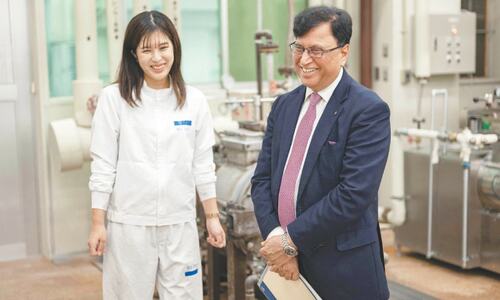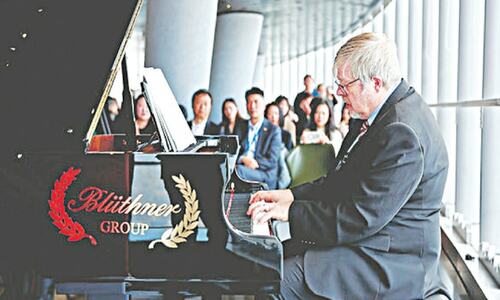DAMASCUS: Bashar Al Assad, the Syrian president, sits back on a smart leather sofa in his honey-coloured hilltop palace, and gestures expansively – his fists visibly unclenched – as he explains his country’s indispensable role in the Middle East in the hopeful era of Barack Obama.
Assad is a busy man. Hours before the Guardian called, he had seen a senior EU commissioner and the secretary general of the Arab League. Later this week his visitors will be Senator John Kerry, the chairman of the Senate foreign relations committee and Howard Berman, a senior Congressman – reflecting the intensifying relationship between old adversaries who seem anxious to make a fresh start.
In recent months Damascus has become the Middle Eastern capital to visit: Nicolas Sarkozy, with characteristic panache, blazed the way for France and Europe; EU foreign ministers followed. Turkey is also playing a key role.
As the world waits for the Obama administration’s first practical steps, expectations of change are high, though tempered by the Gaza war and the result of the Israeli general election, likely to result in a rightwing government under the Likud’s Binyamin Netanyahu.
Assad volunteers he never had high hopes of change in Israel – and certainly not of Netanyahu, who has pledged never to return the Golan Heights to Syria – but puts his faith in a new American role.
“We have the impression that this administration will be different,” he says “and we have seen the signals. But we have to wait for the reality and the results.” He hopes “in principle” to meet Obama, “but it depends on what we discuss. I will be very happy to discuss peace.”
He worries though, about the impact of “other lobbies and other players”.
Relaxed and thoughtful in a dark business suit, Assad seems keen to send out positive messages and to underline his view, inherited from his father Hafez, that Syria is indispensable.
“If you want comprehensive peace in the Middle East you can’t achieve it without Syria,” he says. “We are a player in the region. If you want to talk about peace you cannot advance without us.”Assad’s relief that the Bush era is over is palpable. Though never part of the former US president’s “axis of evil”, Syria has been out in the cold since 2003: its opposition to the war in Iraq, accusations that it let foreign fighters cross its border, its presence in Lebanon and support for groups such as Hezbollah and Hamas made it the bad boy of the region as far as Washington and its allies were concerned. American sanctions under the Syria accountability act remain in force.
“Bush failed in everything,” says the president. “They [the Bush administration] worked hard to achieve regime change. But it didn’t work. It didn’t work because I am not an American puppet and have good relations with my people.”
But Assad sees America’s role as crucial if progress is to be made in the quest for peace in the region. Washington must be the “main arbiter”, he says, but the time has come for an approach based on the principle of land for peace, enunciated in UN resolutions dating back decades and embodied in the 1991 Madrid peace conference, the only forum at which Israel faced all its Arab enemies. “Madrid is still viable,” suggests Assad. “It is a good model.”
The Arab Peace Initiative, first unveiled in 2002 and re-endorsed in 2007, is not quite dead – as he pronounced dramatically at the height of the Gaza bloodshed last month, but rather “in a coma”. Whatever the precise medical analogy, he agrees with a smile, it was Israel that rejected this unprecedented collective Arab offer of peace in return for a withdrawal to the 1967 borders.
Signs are that after the disarray of the Gaza crisis, with the western-backed Arab camp of Egypt and Saudi Arabia confronting Syria, Qatar and non-Arab Iran – there is a fresh urgency to inter-Arab coordination and reconciliation.
Apart from the Arab League’s Amr Musa, another important visitor to Damascus this week was Prince Muqrin, the Saudi intelligence chief – a move seen as the harbinger of a real thaw between Damascus and Riyadh.
Next month’s Arab summit in the Qatar’s capital Doha could be the opportunity for a collective Arab response to recent events: a key issue, says Assad, is to restore Palestinian unity after the debilitating split between the PLO in the West Bank and the Islamists of Hamas in the Gaza Strip.
Hamas is a sensitive issue in Syria. Its exiled leader, Khaled Meshal – once the target of a Mossad hit team – is based in Damascus and enjoys the protection of the authorities. But Assad is quick to defend its right of resistance to Israel – widely supported by ordinary citizens – and to minimise his own influence over the Palestinian movement.
Intriguingly, he says, in one of several thoughtful asides: “You can’t only deal with good people. If they can spoil things or put obstacles in your way you have to deal with them. And I don’t mean Syria and Iran. This is a principle. It applies anywhere in the world. Forget about labels and rhetoric.”
In the light of comments such as these, suggestions he may downgrade his relationship with Hamas or Hezbollah seem wide of the mark. But western diplomats say if Assad wants to see real change with the US he will face pressure not to allow Hezbollah to be supplied, via Syria, with longer-range rockets or anti-aircraft weapons that could change the strategic equation in Lebanon.
Overall, his view is that violence is a symptom, not the cause of the Middle East’s problems.
Nor is Syria’s strategic relationship with Iran, its ally since the 1979 revolution, up for grabs. Dialogue with Tehran should begin at once, he says, and westerners should not “waste their time” on imagining that June’s presidential election will change anything fundamental.
Assad is blunt in rejecting criticism of Syria’s domestic freedom and of the imprisonment of dissidents such as Michel Kilo and Riyad Seif. “Our laws are tough and strict and whether they are right or wrong that is an issue for Syria,” he says.
“We don’t allow anyone to make or internal issues a matter for relations. Europeans and Americans supported the occupation of Iraq. Talking about values has no credibility any more. And after what happened in Gaza they have no right (to criticise us) at all.”—Dawn/The Guardian News Service















































Dear visitor, the comments section is undergoing an overhaul and will return soon.